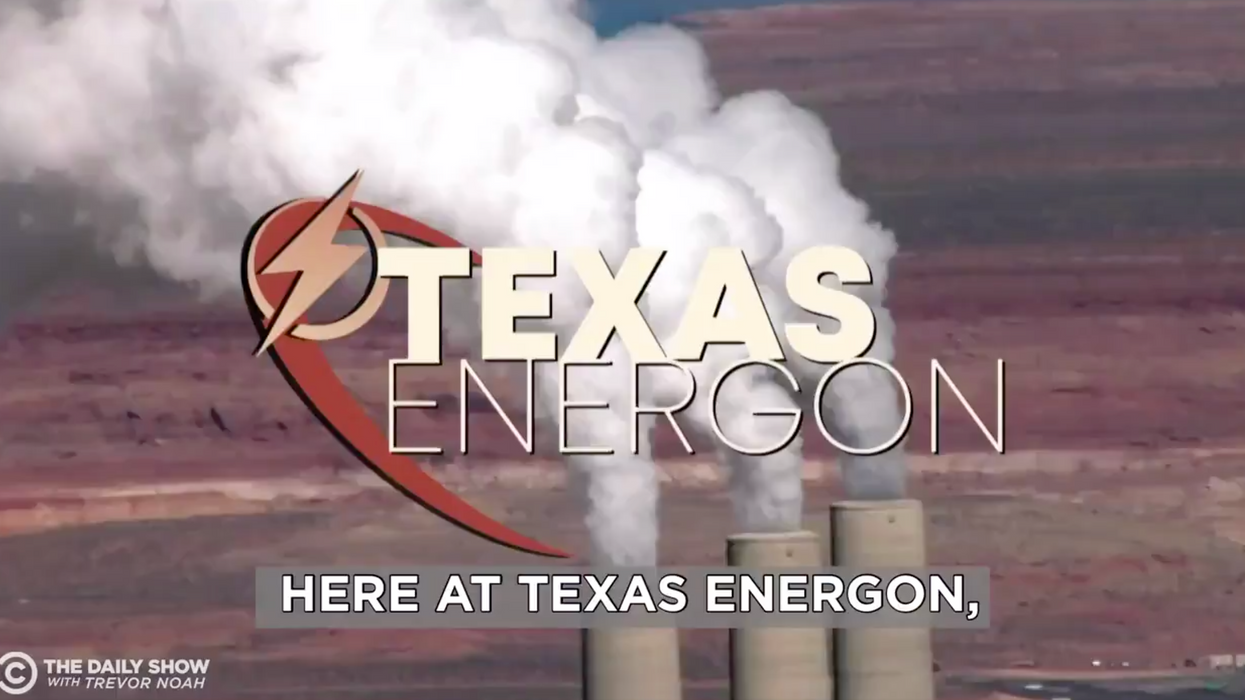How Gov. Abbott Is Helping Power Companies Rob Texans Of Billions
Reprinted with permission from DC Report
The pocketbooks of electricity customers across America are under renewed assault by politicians and friends in the electric power generation business.
Unless America restores a sound economic and legal principle that has protected both consumers and electricity companies for more than a century, Texans and the rest of us can expect bigger and bigger electric bills and possibly more ruinous price gouging.
Odds are you haven't heard that in the news. No one announced it, and most journalism is about covering official announcements. At DCReport we look at facts and decide what we think you need to know. Policies and facts affecting how much you pay for electricity each month are typically news only after a crisis, not as an ongoing news story.
Regulation of electricity is based on the principle of "just and reasonable" rates. That means consumers pay prices they can afford while investors are assured a reasonable profit, typically a ten percent or so return on their assets. Half the states still follow this principle, but half do not.
'Unjust, Unreasonable'
This principle is so thoroughly enshrined in American law that courts have held that when a utility banks a single dollar more than earned, the profit is "unjust and unreasonable."
Texas politicians last week delivered the latest blow to this sound economic principle following the winter freeze debacle that left millions without power and, eventually, water.
Texas electricity producers charged an extra $47 billion during the February 14-19 freeze. Only $10 billion of extra charges were imposed in all of 2020.
It turns out that a third of these extra charges were bogus. Yet amazingly, Texas regulators plan to let power producers keep the $16 billion they improperly overcharged.
The overcharges average $550 per Texan. Steal that much just once in the Lone Star state and you can get a fine of up $2,000 plus a six-month stay at the local sheriff's gray-bar hotel.
Harsh as Texas is on criminals, it goes all soft and fuzzy when it comes to businesses ripping off millions of people for $550 each.
The mistake enabling the overcharges was made by the grid operator, the Energy Reliability Council of Texas. Six of the council's seven members, who do not live in Texas, said they were resigning.
The $16 billion of improper overcharges took place during the final 33 hours, the company that monitors compliance with the Texas rules revealed. Not correcting this "will result in substantial and unjustified economic harm," wrote Chris Bivens, a vice president of Potomac Economics, the Texas market monitor.
Ironically, about $1.5 billion of the overcharges were paid to electric generating station owners to produce electricity in freezing weather, according to Potomac Economics.
For those 33 hours producers sold power at the maximum allowable price of $9,000 per megawatt-hour. The average cost of producing each megawatt ranges from roughly $11 to $37 dollars depending on what fuel is used.
During the freezing weather, the costs of generating power did not go up much or at all. But so many power plants shut that those still running were allowed to boost their prices sky-high.
The typical residential customer in America uses electricity by the kilowatt. For a megawatt, a unit 1,000 times greater, the typical residential cost is in the range of $130.
But Texas electricity generators charged almost 75 times that much. Price markups on that scale are so one-sided that the law treats them as unconscionable, and judges often refuse to enforce such contracts.
Correcting the overcharges would just be too complicated, said Arthur C. D'Andrea, the Texas Public Utilities Commission chairman. "It is impossible to unscramble this sort of egg," D'Andrea said last week.
That's nonsense. It's actually easy.
Letting the excess charges stand would also be bad for attracting digital industries to Texas, a major goal of Gov. Greg Abbott. His administration is courting Silicon Valley firms because California housing prices are so high it's hard to attract young workers. But digital industries require electricity that is both reliably available and predictably priced and Texas just proved it can't deliver.
Electricity shortages are almost certain to worsen in the next few years, as we reported on February 19.
Evidently, PUC chairman D'Andrea didn't get the governor's memo on bringing digital firms to Texas.
Regulation is a dirty word to Abbott and other top Texas officials, Republicans all. But because of its unique nature, electricity regulation is crucial because the modern world runs on it and it is created and used in the same instant.
Electricity is what most distinguishes us from the ancients. People in ancient Athens, Rome and other cities had paved streets, lodging houses, restaurants, retail shops and even resorts. What they lacked were the electrons needed for automobiles and jetliners, night lighting, elevators, refrigerators and computers.
Some Texans are faced with depleting their savings, drawing money from their retirement savings, mortgaging their homes or filing for bankruptcy even though they used the same or less power during the freeze as on other days.
The Texas rules, which I've warned about for 15 years, are clear, the failure to follow them was blatant and the plan to let producers keep the $16 billion of overcharges is unfair, unnecessary and, if litigated, likely to be found unconscionable.
It's reasonable to wonder whether the regulators, all political appointees, made a convenient mistake, in effect subtly telling generating plant owners:
"Fellas, stuff your saddlebags with all you can and ride over to the bank with your ill-got gains while we sightless sheriffs take a nap."
That may sound cynical, but utility regulation is a revolving door everywhere. Commissioners who set electricity rates and grid rules overwhelmingly come from the executive offices at utilities where they return after their stints as public officials. Consumer advocates are as rare as snow in Houston.
The Ghost of Enron
The problem with electricity overcharges extends far beyond Texas, but it began there in the mid-1990s with lobbying by Enron, the fundamentally corrupt energy price manipulator that later went bankrupt.
Enron persuaded the Texas legislature in the mid-1990s to fundamentally change the way electricity is financed and sold. The idea was that while distributing electricity is best done by a monopoly so multiple power lines are not needed everywhere, there's no natural monopoly in generating power. That's more than reasonable — on the surface.
Eventually, half the states decided to replace vertically integrated electric utilities which generated, transmitted and distributed electricity. Instead, independent firms would generate power and bid to sell it to distribution companies in so-called single-price auctions.
Enron argued that when there was more demand for power than expected prices would spike and those spikes would attract new investors who would build more power plants and in the long run prices would come down.
I've yet to meet a businessperson eager to invest in a business where it takes years to go from concept to operation with the expectation that future profits will be smaller than today.
The biggest flaw in the Enron idea, however, is that idea is that doing the opposite is faster, cheaper and comes with less risk while virtually guaranteeing fat profits. You can read our DCReport stories here and here as well as here and here.
Enron sold Texas lawmakers on "single price" electricity auctions.
Here's how a single-price electricity auction works. The grid operator, in this case, the Electric Reliability Council of Texas, calls for bids to supply power for periods that can be as long as a year and as short as a few minutes. Bidders offer to sell power at whatever price they chose.
When bidding closes, everyone whose bid is at or below the price needed to supply all the juice the market needs wins. The winning bidders also get the highest price bid. So even if the average bid was, say, $100, if the highest winning big was $9,000 then every winner gets the $9,000.
Lose-Lose Deals
That means a hydroelectric dam operator with costs of maybe $120 per megawatt-hour can bid one penny to ensure their bid is a winner and then collect thousands of dollars. So, when they throw open the floodgates to make turbines spin, it's almost as if greenbacks instead of water flow like Niagara Falls.
What Wall Street investors figured out, as I did, was another flaw in the Enron plan.
Owners of a single power plant must bid low enough to make sure their electricity is purchased, but owners with a fleet of electricity generators can bid strategically to jack up prices.
Experiments with college students, simple bots and actual bidding records showed years ago that this is exactly what happens, as explained in my 2007 book, Free Lunch.
There are rules against this kind of manipulation, which is why grid operators hire independent market monitors like Potomac Economics. But some market monitors have been less than diligent while others have had their advice ignored as right now in Texas.
On top of this, in one of his first official actions as president in 2017, Donald Trump signaled to Wall Street that fleet owners were pretty much free to manipulate electricity markets, the subject of the second story DCReportpublished.
As for unscrambling that egg, the task that Texas PUC Chairman D'Andrea says is too hard, here is one of several ways to restore fairness.
The Texas PUC can reject charges that exceed the pre-crisis price during those 33 hours. The independent power producers all keep detailed time and price records and can issue revised invoices. They can also sue the state if they want, knowing they risk being tossed out for trying to enforce unconscionable contracts.
Undoing the improper excess charges involves accounting and math but since, unlike the ancients, we have electricity to power computers it's not all that hard to make the calculations necessary to uphold the just and reasonable principle.












